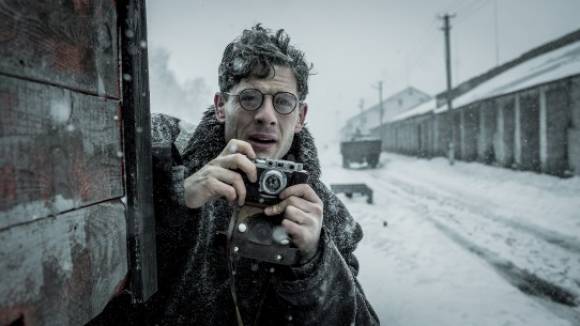Welsh journalist Gareth Jones played by James Norton experiences first hand the famine in Ukraine in 1933 a tragedy that was a triggered by Stalin’s policies. But the story is being hushed up. Jones is determined to make the truth known to the world at large.
Jones is nothing if not ambitious and he had already become famous by working as an advisor to British statesman David Lloyd George played by Kenneth Cranham and encountering Adolf Hitler and Joseph Goebbels. Jones tried to sound the alarm about the dangers of the Nazis but no one is ready to listen. But his work for Lloyd George leads to an invitation to work as a journalist in communist Moscow.
While most of the Western journalists live comfortably and well in Moscow, in 1933, Welsh journalist Jones hears about the famine in the Ukraine and decides to take a train from Moscow to Kharkov in the Ukraine, then part of the communist USSR. When he disembarks at a small station and sets off through the country he experiences the horrors of the famine that is underway in this rural area. The starving and the dead are everywhere, the horror of what is happening overwhelms him. But this catastrophe is man-made. It is the product of Stalin’s forced collectivisation of the land and the agriculture.
Controlling everything are the Soviet secret service agents who are determined to prevent news about the famine from getting out to the general public. Stalin’s policies are tantamount to mass murder. Supported by Ada Brooks, a New York Times reporter, played by Vanessa Kirby, Jones is determined to report what he sees. He succeeds in spreading the shocking news in the West. But he has a powerful rival, the Pulitzer Prize-winning, pro-Stalin journalist Walter Duranty, played by Peter Sarsgaard.
This is a powerful story that remains a political point of contention even today. While Stalin was an ethnic Georgian and the USSR encompassed all the republics of the Soviet Union, not just Russia, the tragedy of the 1932-1933 famine in the Ukraine known as the Holodomor still provokes conflicts between Russia and Ukraine.
The most moving part of Holland’s film is the journey Jones makes across the frozen and hungry Ukraine. The horrors he witnesses amount to nothing short of genocide and comparisons with the German Holocaust comes to mind. Making the story even more powerful is the fact that the Holodomor is much less well known historically in the West than the Holocaust. Jones brought this story to the West but during the time of the Soviet Union it continued to be surpressed.
Given such a powerful and dramatic storyline it is somewhat surprising that Holland has introduced the subtext of the connection between Jones and George Orwell’s Animal Farm. While Orwell’s encounter with Jones is said to have inspired his Animal Farm this theme which runs through the film really does not add much the main story and the viewers are left scratching their heads as to why it is included.
This is a dynamic story and it is sure to get wide distribution but this is a case where straight-forward story-telling and cutting back on some of the sub-texts would have resulted in a better film.
Mr. Jones (Poland, UK, Ukraine)
Directed by Agnieszka Holland
Produced by Film Produkcja www.filmprodukcja.com and Studio Orka www.orkafilm.pl
Coproduced by Crab Apple Films, FILM.UA Group, Mandants (Poland) www.madants.pl
Supported by the Polish Film Institute www.pisf.pl , Krakowskie Biuro Festiwalowe, the Ukrainian State Agency
Cast: James Norton, Vanessa Kirby, Peter Sarsgaard, Joseph Mawle, Fenella Woolgar




















